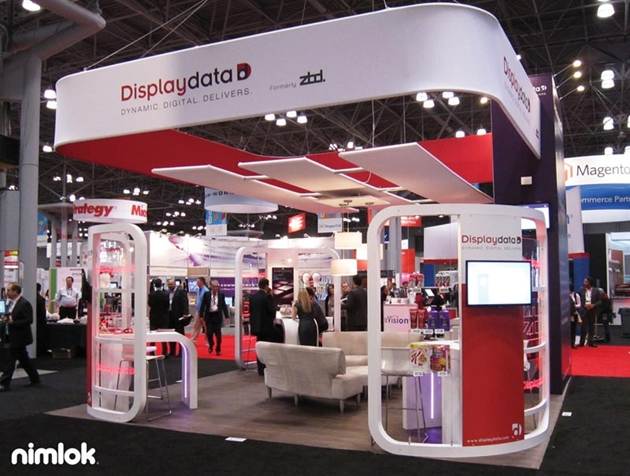You need a solid strategy to stage a successful tradeshow exhibit.
A lot of thought, effort, and planning goes into any marketing exploit, but if you're going to put up a display at a tradeshow, you're going up against every other booth in that space, even if they're not your direct competitors.
You're competing for space, attention, and sales, so you can't get lazy with any part of your tradeshow planning.
1. Get your goals in order
What do you hope to accomplish at the tradeshow?
- Are you interested in generating more leads?
- Do you want to turn 500 prospects into an equal amount of sales, or five times the return on your investment?
- Do you simply want to get your product or service out there and available to more people?
Your goals are your own, so you're the only person who can define them. However, you do need goals, and you need to keep them at the forefront of your mind.
As soon as you know you're attending the show, sit down with everyone involved and come up with a list of goals. Don't make outlandish, unattainable goals you have no hope of reaching, because that will just make you feel you've failed. If need be, start small.
2. Create a game plan around those goals
Once the goals have been decided, you need a strategic plan in place so the team can attain, and hopefully exceed, those goals.
Planning for the tradeshow is not just booking the hotel room and plane tickets for the staff going to work the show. It takes time and it shouldn't be taken lightly.
Consider the following:
- How are you going to drive visitors to your booth?
- Are you going to use direct mail pieces to your current customer base?
- Do you have a plan for calling your customers?
- Will you be hosting a contest?
- Are there going to be giveaways at the show that will entice people to visit your booth?
And what about using social media marketing? Is there a plan to maximize your upcoming show using Twitter, Facebook, YouTube, LinkedIn?
Social media marketing should be well planned, in advance, to build pre-show buzz.
Short video clips about upcoming product releases, services your company offers, teaser demos, teaser clips about the contest or giveaways you're planning... all can be posted on YouTube or your website. Those clips can then be tweeted, posted on your Facebook fan page, shared on LinkedIn, and even incorporated into blog posts.
Social media can be used to reach out to media personalities and influencers within your niche who are attending the tradeshow. Being able to connect with them socially and pitching them an idea to write about or a reason to come visit your booth can be a huge win for your company leading up to the show.
3. Choose valuable team members
A high return on investment (ROI) is probably one of your goals, especially if you're investing a lot to attend the show in the first place.
One of the best ways to ensure an enviable ROI is to have great people on your team.
The people you choose for your booth represent your business. Make sure they're knowledgeable about the product or service, and friendly and engaging; they should be persistent without being aggressive, and responsible. They need to be well versed on the type of questions to be asking to prospective customers who visit the booth to pre-qualify and lead the visitor down the sales process.
Choose team members whom your customers already love.
4. Keep it clean and comfortable
Whether you choose to go all out with bright colors and high-tech displays or you keep things simple and subtle, you still need a clean, comfortable space. Above all, it should feel inviting.
Visitors to your booth should never feel confined or claustrophobic. You're probably wondering how you can avoid that when you're sharing the show with hundreds of other booths, but it's easy.
For example, your company can choose an open-air booth like this one Displaydata create:

Source: Nimlok
Try to avoid clutter, even if you're showing products, sharing demonstrations, or putting up colorful displays. Simply keep them clean, neat, orderly, and attractive.
If your booth requires a table and chairs, that's fine, just try to arrange them in a corner so there's nothing between you and your potential leads when they visit.
5. Make sure they know your name

Source: Nimlok
You can't have too much signage.
On your display booth, your letterhead, your clothing, and your promotional items, put your logo front and center. Everyone who passes by should know the name of your brand or company.
By making yourself instantly recognizable, you're also ensuring that you stay at the forefront of everyone's mind, and that turns into leads.
6. Follow up after the event
It's critical to your goals and ROI for you to have a follow-up strategy in place to maximize the process of relationship-building with the people who gave you their contact information at the tradeshow.
Remember to treat these people as "warm leads," not as ready-to-buy hot prospects. Your strategy should be to send a follow up email, thanking them for stopping by, reminding them of your social media profiles, offering them the opportunity to download some digital asset that would be of value to them.
Those who download what you've offered can then be part of your prospect nurturing campaign, consisting of a series of emails sent over the next 3-6 months.
* * *
It isn't hard to make your tradeshow exhibition successful, as long as you're willing to put in the work ahead of time. I think tradeshows are much better than cold-calling, but you and your company have to take strategic steps to prepare for success. These six tips are a start.
What tips do you have for planning a successful tradeshow?




